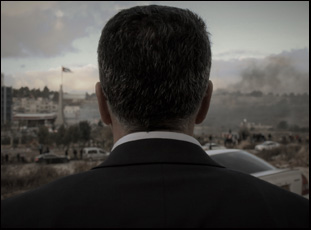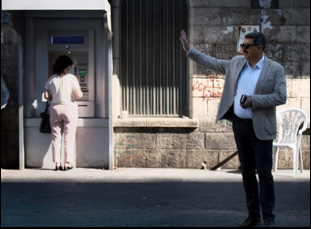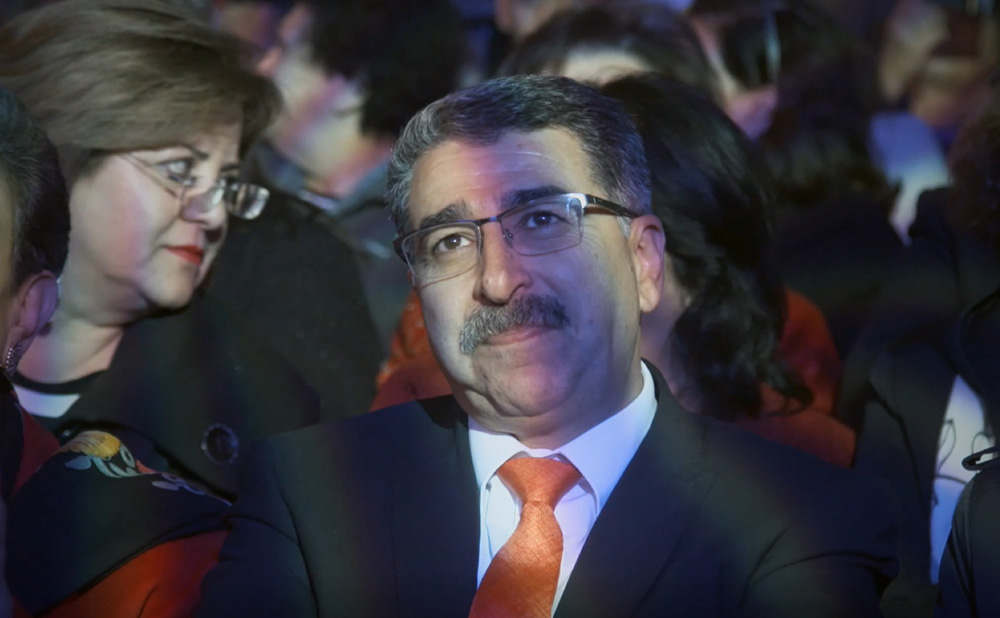When David Osit was editing “Mayor,” he had been listening to the Japanese composer Tōru Takemitsu, whose unique brand of delicate classical music that on the surface might seem incongruous to the film’s setting in Ramallah where daily life is filled with the disruptions of the ongoing Israeli-Palestinian conflict, but synced up quite well to the way the city’s Mayor Musa Hadid had seen it, eager to start new traditions that could give a sense of stability to the citizens in the West Bank that they have longed been deprived of.
“When I heard that and put it over scenes of Ramallah at Christmas time, I felt like I was watching outtakes from ‘Home Alone’ while in the edit room,” recalls Osit, seeing Hadid’s efforts to put his community in the holiday spirit stymied by one thing after another. “I was laughing to myself and it gave me an emotional experience. And when you’re so deeply implicated in the story of the film that you’re making, it’s always a good sign when something surprises you and something moves you… If something can surprise me, I know it’ll surprise somebody else and the whole point of this film was trying to make a surprising portrait.”
With an image of the deeply divided West Bank as calcified globally as the stalemate that has paralyzed anyone in the region from moving forward, that sense of surprise is what makes “Mayor” so profound, shaking up perceptions that have long been set in stone by finding the humor in the inherently ridiculous notion of city planning in a place beset by uncertainty. Tending to daily outbreaks of violence and unsure of who to answer in what’s become a battleground between two countries, Hadid takes his civic duty seriously, but treats the impossible job with good humor and infectious optimism, calming nerves as much as he can as he takes tours around Ramallah and working with what resources he has to improve its daily operations. Yet for as many conversations as there about about setting up a grand working fountain as a centerpiece in front of city hall and a PR campaign emphasizing unity, conceived as “WeRamallah,” they come to appear as literal pipe dreams in a city plagued by sewage floods, lacking permission from Israel to build their own sanitation facility.
While Hadid can hardly make plans for the future, any ideas that Osit may have had for what he would capture flew out the window only five days into filming when like the rest of the world, he learned that the American embassy was being relocated to Jerusalem, a setback for any peace agreement in the region. However, “Mayor” allows audiences anywhere in the world to reconcile any cultural differences they may have with the Palestinians they see on screen simply trying to make a life for themselves, only they’re asked to have far more grace under pressure than most. Unexpectedly delightful and moving in equal turns, “Mayor” is being widely released in virtual cinemas after becoming the talk of the True/False Festival just before the pandemic hit and Osit graciously spoke about how he found such a unique and inviting way into this story and the background that made him so well-suited to create a distinctive film.

It was definitely this career track that I wanted to go on, but the deeper I got into it, I felt quite simply at best, I’d be an average lawyer. [laughs] I was decent at things, but I didn’t feel like I had a very critical mind to be able to innovate within the profession and I wouldn’t be able to do much except with luck get a job and then work at the job and just kind of fill a peg. At the same time, this was around the same time of the DV revolution in documentary filmmaking. Films like “Iraq in Fragments” were coming out and I was starting to watch films by Wiseman and I’d always been interested in the arts, but then film in particular, this lightbulb went off for me like, “Oh, you don’t necessarily need to come from wealth to become a filmmaker anymore. You can get a camera that is relatively affordable and work alone.”
I was always excited about the prospect of being a filmmaker in my dreams, but in never seemed obtainable or doable because I just always assumed it had to be only people who didn’t have to worry about where the money would come from to do it. I didn’t have money, so there was this simultaneous emergence of independent documentary films that were really beautiful and artfully made that were clearly motivated by an interest in something rather than by the fact simply that someone could make a film, but simultaneous to that, [there] was this complete change in the documentary industry, which I think we’ve all almost forgotten how important and seminal that change was in terms of people like me, frankly, to be able to make films.
You actually were a one-man band for “Mayor,” though I’ve heard you thought about expanding the crew at certain points. I wonder whether it turned out to be a blessing in disguise that you didn’t when this has so much personality infused into it?
A lot of times in my career I’ve either worked alone or just with one other person and I’ve ended up wearing a lot of hats just because I enjoy all these different aspects of filmmaking. I’m also a bit of a control freak, so I also enjoy being able to have a say in the editing and the cinematography and the music. I cultivated those skills for my first couple of films to be able to do that stuff on my own, and when it came to this film, I was thinking, “Do I have the ability to shoot this film in the visual style that I’m excited about thinking in?” I had a lot of rules for myself when I started making this film in terms of how it should look, not just in terms of how it can look good, but how it can be a counterpoint to what I thought a lot of other films about this part of the world were not doing that didn’t excite me – a lot of the shaky camera, “you are there” feeling.
That didn’t seem to me to be the right approach for a film that was trying to literally and figuratively reframe the idea of what Palestine could look like to American audiences, so I was trying to figure out what I could do differently. I thought maybe I just don’t have the skill to do that and to bring somebody on, but the more I filmed, I realized it was just simply impossible to keep up with Mayor Musa — to run around with him and to go from moment to moment, I just had to get into a car with him and go. So there was just no time to collect a crew and at that point, the hardest skill I think would be to articulate what I wanted to a crew because I didn’t quite know what I wanted the film to be yet. My favorite films and every film I make is in some degree of discovery and seeing what excites me and what moves me and realizing what doesn’t. For a film like this that felt so immediate and was happening so quickly in front of me, I needed to react very quickly and I just didn’t see how it was possible to do that while being insecure about managing somebody else.

I think everything should change your approach to what is happening. I started filming waiting for those moments, waiting to see how I would respond or the people I was filming would respond and their response and me not knowing what the response would be, me going into the film with a question to answer and not answers to questions. That was fundamental to the film becoming what it could be. I didn’t know how Ramallah would respond when the embassy was moved, and no one knew it would happen on the fifth day of filming. But my job I feel was to respond to moments and capture them in a way that represents what’s interesting to me about what’s happening in this space and the reason I’m here.
That’s a question that I will very cynically, loudly shout at myself when I’m doing anything, like why am I filming this? Is there any reason? Is there any justification for why this is something that’s of interest to me? Is this of interest to other people? And if I can ground that in the idea of how does Ramallah respond, then I go to film a protest and instead of it looking like a typical protest that I’ve seen, [where] there’s a voice of a guy saying, “Half of you are just watching and if you’re embarrassed, please leave,” I thought to myself, “That’s surprising. What does that say about the emotional state of Ramallah when it comes to this moment in time and how people might be just simply exhausted at this point of trying to advocate for themselves?” That’s a door I can unlock and explore as I continue to film, so the whole film is full of moments that surprised me. It’s really just this two-year journey for me personally of trying to answer these questions for myself.
I’ve heard that Musa agreed to this thinking he wouldn’t necessarily be the central character. Did you know from the start he’d likely gravitate towards that position?
I had a strong sense that ultimately he would realize him being the central character wouldn’t be some sort of vainglorious portrait of him, but it would be about the office of the mayor. Something I heard him talk a lot about early on, and I really liked this about him as a politician, is [this idea] “I’m just borrowing this office. I’m not here forever. Someday someone else will be mayor.” And I would talk to him and say, “Listen, I think showing Ramallah through your eyes, through the eyes of its mayor is a really interesting way to see the city.” That was where we started our conversation, so there wasn’t any deceit. I cast a really wide net and I filmed 350 hours of footage from all sorts of different perspectives, filming in Ramallah and the edges of Ramallah and different characters and different institutions both inside and outside the governance of the municipality.
What I kept coming back to was the strongest part of my access to the story of trying to tell Ramallah, it would’ve been disingenuous and impossible, and kind of morally compromising for me, to feel as though I could just come in and tell the story of Ramallah. That would’ve been a goal I couldn’t have pursued, but what I could do is try to tell the story of Ramallah through the eyes of its mayor, because I got to be able to communicate with him. We got to be collaborators and I got to ask him what are you excited about to share with people who have never been to your city. What moves you and what frustrates you? Being able to know that information and honestly make a portrait through his eyes, it always had to orbit around the idea of what’s our vantage point into this story that people know nothing about. How can we make this digestible for people that have never been?
Did having the background you do as an editor give you a sense of how to structure this around the day-to-day operation of the city? The rhythm of this is really striking from early on.
I really wanted the film to be funny and I kind of knew it would be because the first time I met Musa, I was sitting there in his office waiting in his office, a little bit nervous, and he’s finishing up a phone call with one of his constituents and I overhear him saying something like, “Listen, man, you won’t get a parking ticket if you don’t park in that spot. You’ve been calling for months about this and I’m not the chosen one. I’m just the mayor. I’m trying to do my job here.” I remember in that moment thinking, “Wow, this is what I was hoping and thinking the film might be,” which is this fusion of the banality and absurd humor of municipal government, not to engender laughing at someone’s expense, but to throw into stark contrast the terrifying tragedy and absurdity of occupation and the limits of power and how does someone run a city when they’re dealing with so many difficult elements of not having control and autonomy.
The rhythm really emerged from grounding the film in this understanding that it wasn’t that the action or the violence be the core energy and mood and tone of the film, it actually had to be the banality, the simple and relatable elements that would remind you more of an episode of “Veep” than a scene from “Five Broken Cameras.” That was the impetus for the storytelling and everything had to come back to what first intrigued me because I wouldn’t have made the film if it couldn’t stay interesting to me. Everything in the edit always had to come back to what was special to me about this, which is that this is a point of view I never get to see and how does one maintain their dignity in the face of an occupation that is literally consciously trying to strip dignity from people.
It hasn’t taken a traditional path exactly given the pandemic, but what’s it been like to put this out into the world?
It’s a stranger time to sense what the reaction is, but I’m very fortunate in that I got to see 1200 Midwesterners giving the film a standing ovation at the last film festival in the world in 2020 at True/False and they were clapping for this man and his fountain and his Christmas celebrations and what they come to represent over the course of the film. So even though it’s felt somewhat of a remove, the distance between me and the people who get to engage with the film, I know that it works and I got to see it work. I think every filmmaker doubts a little bit at the beginning of the release of their films, will audiences connect? Will they laugh at the parts I think are funny? Will they feel what I feel when I watch this scene? And I got to at least see that once and that’s one of the most incredible gifts of this year is being able to know that it connects for people. Onwards from that, I’m just excited that the film gets to have a life and people get to see it, especially now because we’re at a really critical point in terms of our understanding of how we can help the situation in Palestine. Americans are the group that has to do the helping [as] the backbone of any sort of peace process that could potentially happen in this part of the world. People don’t know what’s going on and people can’t love what they don’t know. People can’t care about what they don’t know.
“Mayor” opens on December 2nd virtually at Film Forum and at cinemas across the country on December 4th, supporting your local arthouse theater. A full list can be found here.




